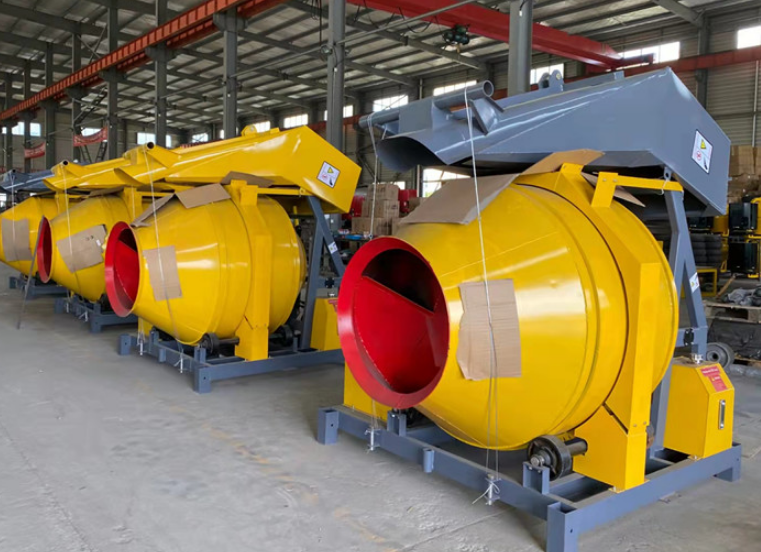When Do You Need a Concrete Mixer? (2024)
Concrete is a fundamental material in construction, renowned for its durability, versatility, and strength. From small DIY projects to large-scale construction endeavors, concrete plays a pivotal role. However, working with concrete requires the right tools to ensure quality and efficiency. One of the essential tools for any concrete-related project is a concrete mixer. But when exactly do you need a concrete mixer? In this article, we'll explore the scenarios where a concrete mixer is indispensable.
Understanding the Role of a Concrete Mixer
A concrete mixer is a device that homogeneously combines cement, aggregates (such as sand or gravel), and water to form concrete. This tool ensures a uniform mix, which is crucial for the integrity and longevity of the concrete structure. There are various types of concrete mixers, ranging from small portable units to large industrial mixers, each catering to different project scales and requirements.
When a Concrete Mixer is Essential
1. Large-Scale Construction Projects
In large-scale construction projects, such as building skyscrapers, bridges, or large residential complexes, the volume of concrete needed is immense. Manually mixing concrete for such projects is impractical and time-consuming. A concrete mixer can produce large batches of concrete efficiently, ensuring a consistent mix and saving considerable labor time.
2. Consistent and Quality Mixes
Achieving a consistent and high-quality concrete mix is critical for the strength and durability of any construction. Manual mixing often results in an inconsistent mix, leading to weak spots in the concrete. Concrete mixers are designed to blend the ingredients thoroughly, providing a uniform mix that meets the required standards.
3. Time-Sensitive Projects
In projects where time is of the essence, such as road repairs or emergency construction work, a concrete mixer can be a lifesaver. These mixers expedite the mixing process, allowing for faster project completion. Time-sensitive projects cannot afford delays caused by manual mixing, making concrete mixers essential.
4. Continuous Pouring Requirements
Some construction projects require continuous pouring of concrete to avoid cold joints, which can weaken the structure. Continuous pouring is challenging to achieve with manual mixing due to the limited mixing capacity and speed. Concrete mixers ensure a steady supply of concrete, facilitating uninterrupted pouring and enhancing structural integrity.
Types of Concrete Mixers
1. Drum Mixers
Drum mixers are the most common type, suitable for various project sizes. They consist of a rotating drum where the concrete ingredients are mixed. Drum mixers come in different capacities, from small portable models for DIY projects to large stationary units for commercial construction.
2. Pan Mixers
Pan mixers have a circular pan with rotating blades inside to mix the concrete. These mixers are known for their ability to produce high-quality mixes and are often used in precast concrete factories and specialized construction projects.
3. Twin-Shaft Mixers
Twin-shaft mixers are ideal for large-scale industrial applications. They feature two horizontal shafts with paddles that rotate in opposite directions, ensuring a rapid and thorough mixing process. These mixers are often used in the production of high-performance concrete and ready-mix plants.
When a Concrete Mixer Might Not Be Necessary
1. Small DIY Projects
For small DIY projects, such as making a few concrete slabs or small garden features, manually mixing concrete in a wheelbarrow or a bucket might suffice. The volume of concrete required is minimal, and the labor involved is manageable.
2. Occasional Use
If your need for concrete is sporadic and on a small scale, investing in a concrete mixer might not be cost-effective. Renting a mixer for occasional use could be a more economical option.
3. Pre-Mixed Concrete
For very small projects or repairs, pre-mixed concrete bags available at hardware stores can be a convenient solution. These mixes require only the addition of water and are ready to use, eliminating the need for a mixer.
Is a Concrete Mixer Worth it?
A mixer efficiently mixes large batches so you can keep pouring. Quality finishing requires working wet concrete at each stage, making it virtually impossible to do it by hand.
Closing Thoughts
Choosing whether to use a concrete mixer depends largely on the scale and nature of your project. For large-scale, time-sensitive, and quality-critical projects, a concrete mixer is indispensable. It ensures a consistent mix, saves time, and enhances the overall quality of the concrete. For smaller, infrequent projects, manual mixing or pre-mixed concrete might suffice.
If you're unsure about your concrete mixing needs or looking to invest in a reliable concrete mixer, don't hesitate to contact us. As a leading supplier of construction equipment, we offer a range of high-quality concrete mixers to suit various project requirements. Our team is here to help you choose the right equipment to ensure the success of your construction endeavors.














